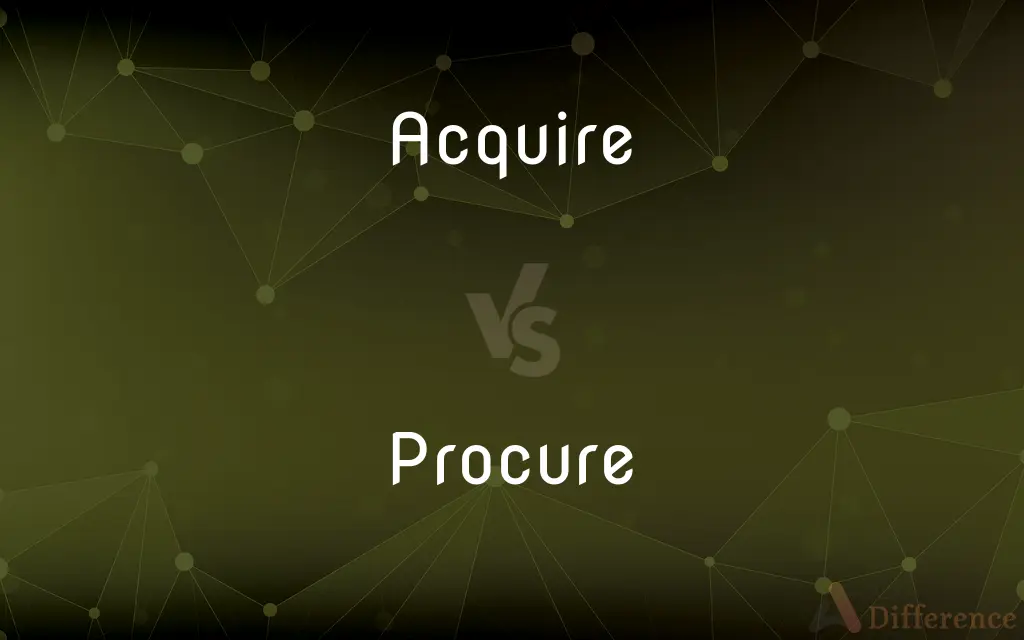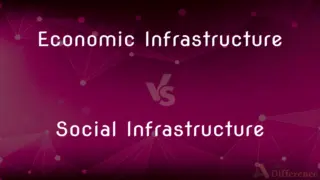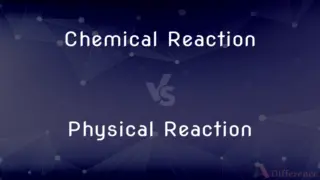Acquire vs. Procure — What's the Difference?
Edited by Tayyaba Rehman — By Urooj Arif — Published on July 22, 2024
Acquire focuses on obtaining assets or skills over time, often without specifying how, while procure emphasizes the effort of obtaining supplies or services, usually for business or formal use.

Difference Between Acquire and Procure
Table of Contents
ADVERTISEMENT
Key Differences
Acquire typically refers to the act of gaining possession or ownership of an asset or skill, often through a process that might not be specified. This can be through buying, inheriting, or learning. Procure, on the other hand, suggests a more active and deliberate effort to obtain something, especially for business or official purposes, often involving negotiation or formal processes.
The term acquire is often used in a broad sense, applicable to both tangible and intangible assets, such as property, skills, or knowledge. It implies a sense of accumulation over time. Procure is more specific and is commonly associated with acquiring goods, services, or contracts through purchase or formal agreement, often for a company or government.
Acquisition can be a gradual process, such as acquiring a language over several years through immersion and study. Procurement usually involves a planned and structured process, including bidding, negotiation, and fulfillment of specific terms and conditions.
The context in which acquire and procure are used also differs; acquire is more versatile and can be used in casual or formal contexts, whereas procure is predominantly used in formal, business, or legal contexts, emphasizing the procedural aspect of obtaining something.
Acquire might not always imply effort or intention, as it can sometimes happen passively or as a matter of course. Procure, however, almost always implies a degree of effort, intention, and action towards obtaining something specific.
ADVERTISEMENT
Comparison Chart
Definition
Gaining ownership or knowledge
Obtaining goods/services through effort
Context
Broad, informal or formal
Mostly formal, business-oriented
Process
Can be passive or active
Actively involves negotiation or bidding
Application
Tangible and intangible assets
Primarily goods, services, contracts
Implication
Accumulation over time
Deliberate action, often immediate
Compare with Definitions
Acquire
Gaining property through purchase or inheritance.
She acquired a new home after years of saving.
Procure
Obtaining supplies for a business.
The department is responsible for procuring office supplies.
Acquire
Learning a skill or knowledge over time.
He acquired fluency in French through immersion.
Procure
Arranging for the delivery of goods.
He procured the necessary parts from overseas.
Acquire
Coming into possession of a company or asset.
The tech giant acquired several startups last year.
Procure
Securing services through a contract.
They procured a cleaning service for the building.
Acquire
Developing a habit or condition.
She acquired a taste for classical music.
Procure
Acquiring goods through purchase or negotiation.
We need to procure more materials for the project.
Acquire
Adding something to a collection.
They've acquired a rare painting for their gallery.
Procure
Sourcing products in a supply chain.
The company procures its raw materials from sustainable sources.
Acquire
To gain possession of
Acquire 100 shares of stock.
Procure
To get by special effort; obtain or acquire
Managed to procure a pass.
Acquire
To get by one's own efforts
Acquire proficiency in math.
Procure
To bring about; effect
Procure a solution to a knotty problem.
Acquire
To gain through experience; come by
Acquired a growing dislike of television sitcoms.
Procure
(transitive) To acquire or obtain.
Acquire
(transitive) To get.
Procure
To induce or persuade someone to do something.
Acquire
(transitive) To gain, usually by one's own exertions; to get as one's own
He acquired a title.
All the riches he acquired were from hard work.
One should acquire as much knowledge as possible from reading.
To acquire a skill
To acquire decent habits and manners
Procure
(obsolete) To cause to come; to bring; to attract.
Acquire
Win something through one's efforts;
I acquired a passing knowledge of Chinese
Gain an understanding of international finance
Procure
To bring into possession; to cause to accrue to, or to come into possession of; to acquire or provide for one's self or for another; to gain; to get; to obtain by any means, as by purchase or loan.
If we procure not to ourselves more woe.
Acquire
Acquire or gain knowledge or skills;
She learned dancing from her sister
I learned Sanskrit
Children acquire language at an amazing rate
Common Curiosities
Does acquire always involve buying?
No, acquire can involve various methods of coming into possession, including buying, inheriting, learning, or developing naturally over time.
Is procure only related to business transactions?
Primarily, yes. Procure is mostly used in the context of business, government, or formal transactions involving goods, services, or contracts.
Does procurement require a contract?
Often, yes. Procurement typically involves formal agreements or contracts, especially in business or government contexts.
What is the main difference between acquire and procure?
Acquire is about gaining possession or skills, often over time, while procure focuses on the effort to obtain goods or services, usually for formal or business purposes.
Can acquire refer to negative acquisitions?
Yes, it can refer to acquiring debts, diseases, or habits considered negative.
What is procurement management?
It's the business process of obtaining goods and services in the most cost-effective and efficient manner, often involving strategic planning, sourcing, negotiation, and contract management.
Is acquiring knowledge different from acquiring physical goods?
Yes, acquiring knowledge involves a learning process and intellectual engagement, while acquiring physical goods involves transactions or exchanges.
Can a person be procured?
In contemporary usage, "procure" referring to a person often has a negative connotation, typically in the context of illegal or unethical activities. It is not commonly used in legal or ethical contexts.
Can acquire be used instead of procure?
While sometimes used interchangeably, "acquire" is more general and can imply a broader range of obtaining, whereas "procure" is more specific to formal acquisition processes.
Can services be acquired?
Yes, services can be acquired, especially when referring to obtaining them over time or through a learning process.
Is acquiring faster than procuring?
Not necessarily; the speed depends on the context. Acquiring can be a slow process, like learning a skill, while procuring, especially in business, can be time-sensitive.
Can acquire be passive?
Yes, one can acquire something passively, like acquiring a taste for something or inheriting property.
Is procurement part of supply chain management?
Yes, it is a critical component, focusing on acquiring goods and services needed to produce the final product.
How does digital procurement differ from traditional procurement?
Digital procurement involves using online platforms and digital tools to streamline the procurement process, making it faster, more efficient, and often more cost-effective compared to traditional methods.
What does it mean to procure funding?
It means to secure financial resources through efforts such as applications, negotiations, or presentations, typically for projects or business ventures.
Share Your Discovery

Previous Comparison
Economic Infrastructure vs. Social Infrastructure
Next Comparison
Chemical Reaction vs. Physical ReactionAuthor Spotlight
Written by
Urooj ArifUrooj is a skilled content writer at Ask Difference, known for her exceptional ability to simplify complex topics into engaging and informative content. With a passion for research and a flair for clear, concise writing, she consistently delivers articles that resonate with our diverse audience.
Edited by
Tayyaba RehmanTayyaba Rehman is a distinguished writer, currently serving as a primary contributor to askdifference.com. As a researcher in semantics and etymology, Tayyaba's passion for the complexity of languages and their distinctions has found a perfect home on the platform. Tayyaba delves into the intricacies of language, distinguishing between commonly confused words and phrases, thereby providing clarity for readers worldwide.












































